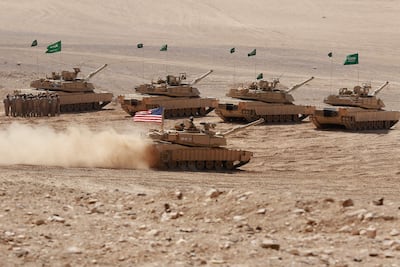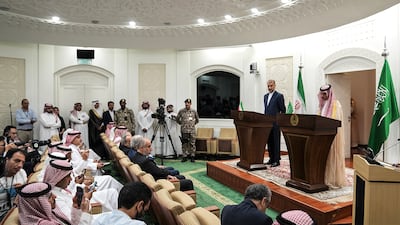A pivotal shift has materialised in Iranian foreign policy, suggesting a profound transformation is under way in Tehran’s grand strategy towards relations with Arab Gulf countries.
For its part, the Biden administration has made a notable about-face, abandoning the policy of past US administrations to exclude the Gulf states from US-Iranian nuclear negotiations.
Washington now welcomes Saudi-Iran rapprochement as it aligns with American interests. It views this improvement in relations as an opportunity to establish an additional communication channel with Tehran, with a view to nudge Iran away from Russia in the aftermath of the Ukrainian conflict.
However, the primary obstacle to any hopes of seeing a new Iran lies in the contradiction between the established dogma of its regime and its transitional pragmatism.
Iranian Foreign Minister Hossein Amir-Abdollahian articulated a compelling sentiment during his recent visit to Riyadh, which aimed at restoring diplomatic ties and paving the way for Iranian President Ebrahim Raisi’s trip to the Saudi capital soon. He said that Iran can collaborate with Saudi Arabia to promptly resolve regional issues, underscoring Tehran’s support for achieving security and harmony in the region without fragmentation.
These words await to be matched by deeds, nonetheless a few questions arise.
Where does Iran’s supreme leader, Ayatollah Ali Khamenei, stand on rapprochement? What are the conditions demanded by the Islamic Revolutionary Guard Corps, which exercises control over Iranian foreign policy? How does Israel factor into the equation? Will exclusive sway over Lebanon be granted to Hezbollah as compensation for suspending its regional activities?

Such complex issues appear to have been parked aside for now, as Riyadh and Tehran focus on bilateral issues, as well as Gulf security, in their “first basket” of discussions, while putting Hezbollah’s regional roles into the “second basket”. This approach is due to concerns that bringing Hezbollah’s activities to the negotiation table could jeopardise the talks.
However, the issue with such an approach is that it implies a potential willingness to grant Iran exceptions in the region. The reality on the ground, after all, indicates that regional stability cannot be achieved without addressing Iran’s regional activities.
Nonetheless, it seems that the Biden administration doesn’t oppose focusing on the “first basket”. It is open to postponing discussions around the thorny issues, including Hezbollah’s dominance in Lebanon, if there is an implicit understanding that there will be no military confrontation between the Iranian proxy and Israel – regardless of the public posturing seen on both sides.
The Biden administration’s priority is to capitalise on Iran’s willingness to shift its stance and behaviour in the Gulf and towards the US. It will also hope it can play a role in countering Russian influence in the region. If Tehran is willing to accept American goodwill, Washington may be prepared to offer incentives similar to the deal that saw the release of American detainees and prisoners in exchange for the release of $6 billion of Iranian assets held in South Korea.
Iran fully comprehends that it needs American help if it wants to return to the global markets and develop its oil and technological infrastructure, as well as restore normality. Moscow has limitations in how much support it can extend to Iran due to the war in Ukraine. China, meanwhile, does not impose on Iran the decision to align either with itself or with the US, nor is the Biden administration doing so.
Of course, the Iranian regime isn’t compromising on its ideology. It is, instead, introducing modifications to it and adopting a more tempered approach to accommodate new realities. This strategy is designed to sustain itself.
Tehran aspires for regional respect and the restoration of its prestige.
On the other hand, Hezbollah is determined to strengthen its grip over Lebanon. Up to this point, it has enjoyed substantial backing from influential members within the Iranian regime.
Some experts, particularly in the Arab world, expect an eventual power struggle in Tehran to lead to a reduction in the IRGC’s influence. Consequently, they believe, Hezbollah will become weaker and, therefore, be willing to align with Iran’s place in the world and assume a more proportionate role regionally and within Lebanon.
While this outcome may sound logical, it remains a mere possibility rather than reflecting an established policy. Herein lies the inherent danger and potential miscalculation.
One could argue that the problem in Lebanon lies within its political class and opportunistic alliances among various political parties. Similarly, one could argue that Lebanon’s economic decline is chiefly the responsibility of the government, parties, representatives, and people. However, these facts don’t invalidate the observation that regional stability will remain elusive as long as Hezbollah maintains its dominance in Lebanon (even as it scales back its regional activities).
Saudi Foreign Minister Prince Faisal bin Farhan said that the restoration of his country’s diplomatic ties with Iran was a pivotal juncture for regional security. This is undeniably valid. He further underscored Saudi Arabia’s aspiration to bolster bilateral relations with Tehran, expressing a sincere and earnest desire to cultivate mutual trust. This stance is also on the mark, given that regional security forms an integral facet of bilateral relations.
Nevertheless, this phase has yet to reach the stage of complete trust; rather, it represents a probation period based on good intentions, extending beyond mere bilateral dynamics.
Other GCC countries are also working towards improving relations with Iran. Some are playing a role in achieving closer ties between Washington and Tehran, including on matters related to Iran’s nuclear weapons programme and the gradual removal of US sanctions on Iran, as an alternative to a comprehensive nuclear deal. This comprehensive deal had previously excluded the Gulf countries, due to decisions made by Iran, the US and Europe, with the agreement of China and Russia.
Times have changed, and historical circumstances have led to an unforeseen shift due to the war in Ukraine and Nato’s subsequent expansion both within and beyond Europe. The Biden administration is aiming to increase Russian isolation by attempting to separate Tehran from Moscow.
That said, the ongoing US-Iran agreements include elements of a more comprehensive deal that goes beyond the mere reduction of tensions between Washington and Tehran. If it materialises, this strategic deal will be akin to a “Grand Bargain”. As is said, however, the devil is in the details.


